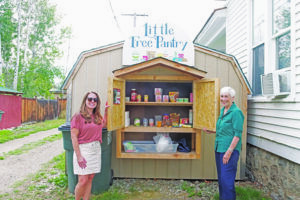
by John Dowd
St. Paul’s Episcopal Church, in Hamilton, has spearheaded a free food pantry in Hamilton for nearly a year. The idea is a nationwide concept where there is a cabinet, storage bin or other large container that is strategically placed in a city or town where the public has access to it. Community members can swing by at any time and donate food to it, or take food from it. The entire process is anonymous, and according to church goers, it is the only one in the valley that they know of.
The concept was the brainchild of Alana Cruse, a candidate for ordination to the Diaconate there at the church. She was visiting a friend in Chicago when she noticed several free pantry boxes throughout the city. She thought the idea would be perfect for her area, in the Bitterroot Valley, and brought it up at a church meeting. It was immediately a hit and they worked on organizing it.
According to Cruse, what started as a simple plastic chest soon became a needed service. “I thought we’d have this little Rubbermaid forever, but the community has really gotten behind it,” said Cruse.
The program was started in the winter of 2022. Cruse explained that she believed, because of the food insecurity in much of the country and especially in the valley, that the idea of the food pantry would be extremely positive in the area.
According to Mary Lyn, a member of St. Paul’s Episcopal Church, they try to, “keep things that are easy to use without cooking facilities.” Both women expressed that as an important consideration for donors. Many who need the goods from the pantry may be living on the street or out of vehicles and may not have the ability to cook their food. This means that canned soups and pre-cooked and preserved foods are always in high demand.
The demand is high, said Cruse. “The fact that we can’t keep it full shows the need.” According to Lyn, “Nobody should be hungry. Nobody should have to make those hard choices, but they do today.’’ To both women, the important part of the pantry is that it is anonymous. They explained that it can be very anxiety-inducing for some people. They say nobody wants to show how much they may need help, and “not everybody is social and not everybody can come to a soup gathering,” said Cruse. The pantry is a way to help others “without getting into someone’s business.”
The pantry changes every winter, removing and saving canned goods for warmer months so they won’t freeze and burst. Also during winter, community members are encouraged to donate small clothing items like scarves, gloves and hats. During the summer, said Lyn, “fresh fruits and vegetables go in a hurry.” Other things to be considered year round include toiletries, hygiene products, tote bags, bread and more. The pantry is available to anyone 24-7.
Two community members donated their time to build the pantry cabinet and the sign that sits over it. Many people donate food and goods. According to the women, there are also a lot who donate money to the church to keep the pantry filled. The program has grown so much that it is no longer just the church, but the whole community that keeps the pantry filled. They even talked about some organizations that regularly donate to the cause and work to keep the pantry full.
When asked why the program is so important, Lyn said, “It can be any one of us.” Cruse added, “We feed people because it’s part of being a community.”
More information about the free food pantry can be found by contacting St. Paul’s Episcopal Church at (406) 363-3025.